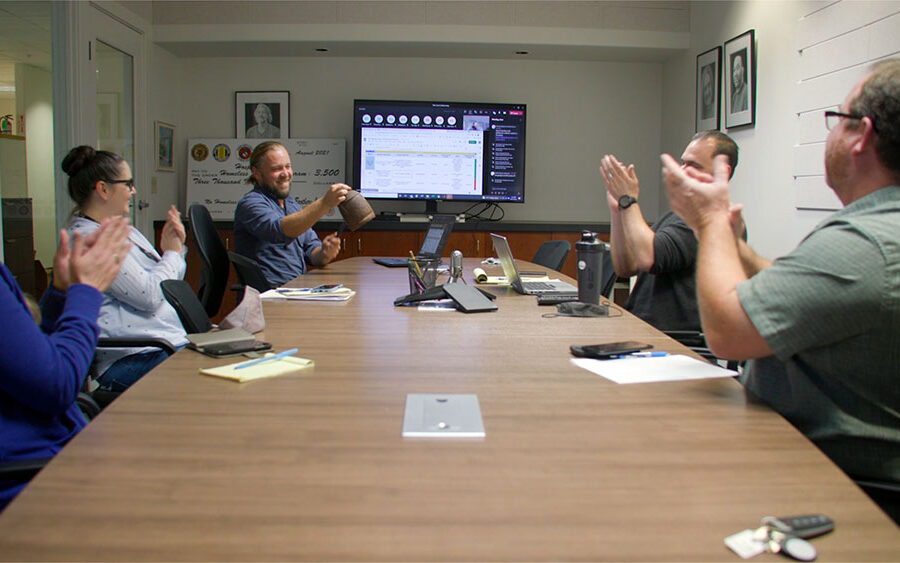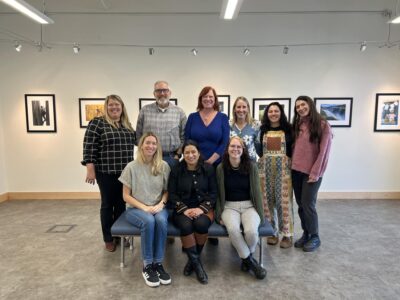Nevada County is working toward becoming the 13th community in the US to reach the milestone for making veteran homelessness rare and brief
Media Contact: Lauren Barnes, Community Solutions, lbarnes@community.solutions
Assets: Accompanying photos, videos and captions can be downloaded here
NEVADA COUNTY, CA — Today, Built for Zero announced that Nevada County, California, is closing in on the milestone for making veteran homelessness rare and brief in their community. With 21 veterans experiencing homelessness on their by-name list, the Nevada County Built for Zero team is continuing to improve its homeless response system with the hopes of reaching this milestone, known as functional zero, in the coming months.
Ryan Gruver, Nevada County Health and Human Services Agency Director, said, “We are serious about reaching functional zero, and achieving it will mean pulling together local, state and national efforts and resources to help Nevada County’s unhoused veterans. We’re in a historic moment of resources, opportunity and momentum. Everything from our data, to our resources, to our teamwork tells us this goal is within reach.”
In order to achieve functional zero, the community will continue to reduce the number of veterans experiencing homelessness to three or fewer. To date, only 12 communities have been validated by Built for Zero for achieving functional zero for veteran homelessness. Bakersfield, CA has achieved functional zero for chronic homelessness. Functional zero is a milestone that makes homlessness rare and brief and demonstrates that the community has fewer veterans experiencing homelessness than can be routinely housed.
David West, Nevada County Veterans Services Officer, said, “Reaching functional zero is not about a single moment, but establishing a new reality where veteran homelessness remains rare and brief when it occurs. We can get there, but we will need community support too.”
For the county, achieving functional zero for veterans is an initial step toward ending homelessness for all populations. Built for Zero communities that have ended homelessness for one population are often able to apply those learnings to end homelessness for the next population — working systematically towards ending homelessness for all.
Emma Beers, Built for Zero Strategy Lead, said, “This progress is the success of a community-wide effort, indicating that the community has created a coordinated, data-driven system that connects homeless veterans to the support they need to exit homelessness soon after they’ve been identified. This important milestone will help propel the systems-change work needed toward ending homelessness for all populations.”
A SYSTEM DESIGNED TO GET TO ZERO
To achieve this progress toward functional zero, Nevada County has designed an effective system based on continuous community collaboration, a real-time, by-name list of everyone experiencing homelessness and leveraging emergency COVID resources.
Nancy Baglietto, the Executive Director of Foothill House of Hospitality, said: “Community and collaboration is absolutely critical to us getting this work done. Through Better Together, we are working with our stakeholders to keep the community informed of our constantly growing and evolving partnerships, as well as ongoing projects and events aimed at ending homelessness. Our work with Built for Zero is proving that homelessness is solvable and we are indeed better together.”
The community has worked on connecting organizations that were providing services to those experiencing homelessness. Once siloed, they now meet weekly for case conferencing to discuss how to house people on their by-name list.
A by-name list includes every person in a community experiencing homelessness, updated in real time. This dynamic list drives community efforts in a focused, personalized manner to assure that every person in need is identified and can receive assistance.
Brendan Philips, Nevada County Housing Resource Manager, said: “My fear had always been that data would start to dehumanize our work, but I couldn’t say more that that is further from the truth. The data has really driven a lot more humanity in our system as well. Knowing each veteran by-name and in real time has changed our ability to connect them with individual resources and exit them from homelessness more quickly.”
Because the community had created a real-time, by-name list, they were able to leverage additional resources to create more housing options with COVID-19 funds and resources to make measurable reductions in veteran homelessness.
LANDLORD ENGAGEMENT IS KEY TO REACHING ZERO
In order to reach functional zero, officials say landlord engagement is key.
Affordable rental housing options in Nevada County are limited and those who have been homeless or are at risk of homelessness have challenges that require additional support to landlords that rent to them.
Nevada County created the Landlord Liaison Program to bridge the gap between the unhoused and landlords by providing guaranteed rent and master legging, financial incentives for landlords, money for appliance repair and replacement and one number to call for next-day assistance.
Jennifer Price, CEO of AMI Housing, said, “Each additional housing unit helps us get another local resident housed and back on their feet. Our landlord recruitment program gets the community involved in being part of the solution, and we’re here to provide additional support to landlords to help make this possible.”
To learn more about the program, landlords can call 530-878-5088 or email AMI housing at hct@amihousing.org.
****
Built for Zero is a national initiative of more than 100 cities and counties that have committed to measurably ending homelessness, one population at a time. It is led by Community Solutions, a nonprofit that works to create a lasting end to homelessness that leaves no one behind. Using a data-driven methodology, these communities have changed how local homeless response systems work and the impact they can achieve. Learn more at www.builtforzero.org or follow us at @BuiltforZero. Media Contact: Lauren Barnes, lbarnes@community.solutions



